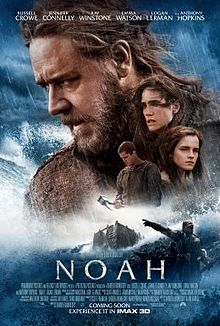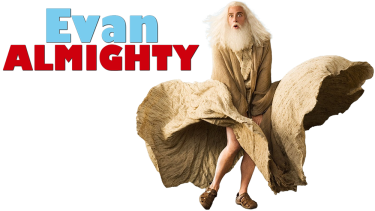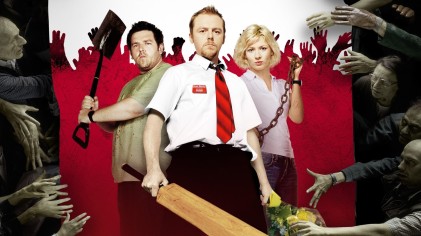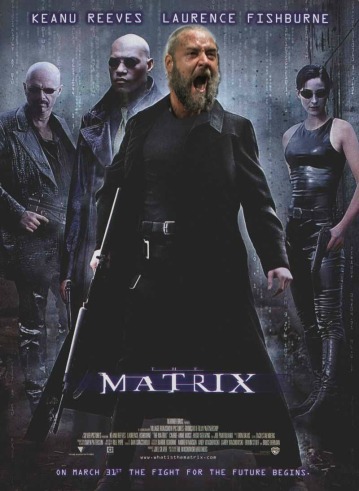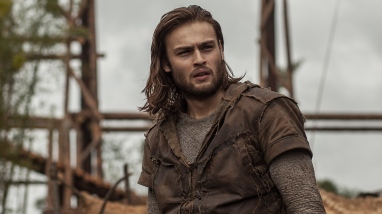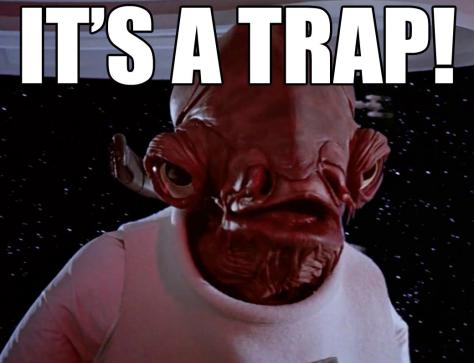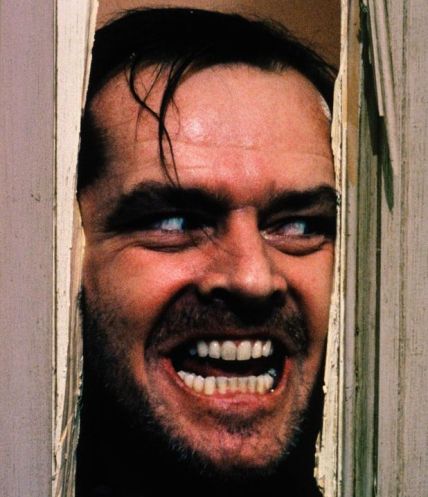This is it, guys. Look no further, because this is THE definitive review of the movie ‘Noah.’ I’m going to tell you right here, right now, exactly how high or low the quality of this film is. Okay? Okay.
Is ‘Noah’ a good movie?
Eh…
What? You want me to be more specific? Sigh. Fine.
I went into this movie with the mindset that I wasn’t going to be nit-picky and judge it on the liberties Darren Aronofsky took with the original text. The things Aronofsky added to the narrative were necessary. The Biblical story of Noah is, what, two or three pages? Of course he’s going to have to add stuff. It’s so obvious that I’m not even going to talk about it. Lord knows enough critics have done that already.
Besides, there’s much more interesting stuff to talk about anyway.
I went into this movie thinking of it the same way that I would normally think of an adaptation of a book. Film and text are two totally different mediums. What works well for one, in terms of storytelling, may not work for the other. I tend to judge book-to-movie adaptations on two separate scales, 1) whether or not it is a good translation of the source material (in the sense that it preserves the original message), and 2) whether or not it is a good standalone film.
As far as Scale #1 goes, Aronofsky himself said that ‘Noah’ was going to be the “least Biblical film ever made.” So what did everyone expect? Perfect, cookie-cutter good guy Noah and his perfect family hugging fluffy animals on a big, fun party boat singing Kumbaya/Hooray Everyone Is Dead But Us?
I don’t know about you, but this is what I was picturing.
That would have been the most boring adaptation of Noah’s Ark EVER. And it probably wouldn’t have ended up being very spiritually valuable, either.
So, instead of talking technical details, let’s talk theology.
There has been a claim made by theologian Dr. Brian Mattson that this film is basically a poster-child for Gnosticism (his article can be found here). While I found his take to be interesting, I was uneasy with much of what he was saying about the film thematically.
Mattson is correct about some things. For example, he does point out that the film borrows from Kabbalah, which is a school of thought within Judaism that explores the relationship between the spiritual and the material.
As Mattson rightly points out, some Kabbalistic teachings do show up in this film. To begin with, Adam and Eve are shown briefly as luminous beings rather than your average flesh-and-blood Joes. There are fallen angels featured in the film who end up being redeemed by the end. The human race is depicted as being segregated into two groups: the nice descendants of Seth, and the not-nice descendants of Cain. Not your typical fundamentalist Christian back-story.

Why can’t I get Jergens Natural Glow Daily Moisturizer to do that?
But then, Mattson takes things a little too far. Because these particular Kabbalistic teachings are similar to some of the teachings found in Gnosticism, Mattson decides that the entire philosophy of the film must be Gnostic. He then proceeds to try and make everything else in the movie fit into this ill-founded, preconceived notion.
For example, he states that Gnosticism teaches that the world was created by a lesser, nastier god, and since this movie is so clearly Gnostic, then the Creator referenced in the film must be a portrayal of that lesser god.
Oh gosh, really? That sounds like a pretty substantial claim. He’s probably going to back that up with something that happens in the movie to support that idea oh wait no he’s not. I guess we’ll just have to take his word for it, then.
While it is true that Gnosticism borrows from Kabbalistic teachings (as do many other belief systems/celebrities trying to be deep), the overall attitude of Gnosticism differs vastly from Kabbalah. Gnosticism asserts that creation is bad and that the only goodness lies with the immaterial. Conversely, Kabbalah views creation as being damaged, but ultimately redeemable.
Now, Aronofsky’s ‘Noah’ exhibits great respect for creation, so Mattson’s interpretation here is significantly misguided. Also, Mattson’s claim that the Creator in the film is silent, evil, and generally contentious is simply not accurate at all. Nowhere in the film is it indicated that the Creator is the mustache-twirling villain. Nowhere is it indicated that, as Mattson puts it, “the serpent was right all along.” In fact, the exact opposite is insinuated. Any doubts Noah has about the Creator’s plan, and any of the heinous actions he takes that he thinks are in service of the Creator are contradicted quite strongly by the other characters in the film.
There was one thing in this movie which Mattson mentions in his article that actually did put me off when I saw it: the snake-skin.
For those of you who haven’t seen the film, the snake is shown shedding its skin before approaching Adam and Eve in the Garden of Eden as part of the film’s back-story. That snake-skin is then treasured as a relic, and passed down through Seth’s bloodline from generation to generation. The film actually opens with Noah as a young boy being blessed with the snake-skin by his father Lamech (until Lamech is killed and the snake-skin is stolen by the film’s main villain).

Initially, this creeped me out. But then I read this article by Orthodox film critic Peter Chattaway, in which he debunks Brian Mattson’s article and explores the influence of Kabbalah on Aronofsky’s interpretation of the story of Noah. In his review, he gives credit to several other writers who observed that the snake is originally depicted in the Garden as a glowing, beautiful creature, similar to Adam and Eve, until it sheds its green skin and becomes black in color. The skin itself can then be interpreted as a reminder of Creation’s original goodness, not as a thing of evil.
So, is this film a good translation of the source material? I think I would say yes. It isn’t the adaptation that the fundamentalists were hoping for, but it’s definitely a much more interesting one.
Now for Scale #2: is it a good standalone film?
Meh…
(Warning: In this section of the review, I will be going through the entire plot of the movie. For those of you who haven’t seen it, I will cut you off after my general thoughts about the film with a big, all-caps ‘spoiler alert.’)
So, this movie has some great stuff going for it. The special effects and cinematography were beautiful. My favorite parts of the film were Noah’s dream sequences. They were gorgeous, creepy, and very effective as plot devices. If Aronofsky had decided to have God’s booming voice reverberating through the sky, telling Noah everything he needed to know, I probably would have rolled my eyes. For this movie, it just would have been too hokey.
There was also some really solid acting in this film. Russell Crowe as Noah was pretty much perfectly cast, and he gave an excellent performance. Jennifer Connelly and Emma Watson were fabulous, Ray Winstone was great, but Anthony Hopkins as Methuselah really took the proverbial cake. He should have had way more screen time, if you ask me.
But when it comes to the story and characters…honestly, this movie left me cold.
I was more emotionally invested in ‘Evan Almighty’ than I was in ‘Noah.’
Yes. This movie. I was more emotionally invested in THIS MOVIE.
To be more specific, I thought most of the characters were two-dimensional, the rock monsters were dumb, and Shem was prettier than me, which I resented.
Let’s just go through the story, shall we?
Oh, and here’s that ***SPOILER ALERT*** that I mentioned earlier.
The film opens with a brief synopsis of Genesis; Creation, the Fall, Abel’s murder, and the establishment of Cain’s civilization. A silhouette of Cain raising his arm and smashing his brother’s skull in with a rock is used in this montage, and it is repeated throughout the film until it is directly mirrored when the Main Bad Guy tries to kill Noah towards the end. I mention this because I thought it was a really great use of imagery that let the audience know (and consistently reminded them) what exactly went wrong with humanity and why the Flood had to happen at all.

As I said earlier, the story begins with young Noah witnessing the murder of his father and the theft of the snake-skin. Then, we see Noah all grown up and foraging with his young children for tiny, fuzzy plants to eat. Suddenly, he sees a bizarre dog creature covered in scales run by.
Noah tells his children to hide and then runs after Scaly Dog. At first, I thought he was chasing it because WHOA IT’S A SCALY DOG THAT’S WEIRD, but no, he’s actually chasing it because it has an arrow in its flank, and I guess he feels bad for it or something.
The hunters who wounded Scaly Dog soon catch up to Noah, and they have a cool fight sequence. This is where the undertone of environmentalism in this film first materializes, and a line is drawn that separates Noah and his family, the virtuous non-meat-eaters, from the carnivorous Black Hats (bad guys).
To be fair, animal-eating is not the main vice the Black Hats are shown to indulge in. They are vicious barbarians who have no problem with murder and violence, and their cruelty towards the animals they intend to devour gave me flashbacks to certain scenes in ‘Shaun of the Dead.’
Simon Pegg, you complete me.
Also, as Genesis 9:1-5 indicates, God only allowed mankind to eat meat AFTER the flood. So really, Aronofsky got this part right. However, he conveniently failed to include a part at the end where the Creator tells Noah and his family that they can now abandon their vegan ways, which makes me think he only capitalized on that particular part of the culture back then to send an environmentalist message.
Shortly after this event, Noah has a dream about the flood. So, he packs his family up and they go to visit his great-grandfather Methuselah for some unexplained reason who, for some other unexplained reason, lives in a cave and hasn’t even met his great great grandkids. On the way, they pick up a little orphaned girl named Ila who’s been stabbed in the gut (which, as we discover later, results in her infertility).
Then some Black Hats chase them, and they end up escaping into Watcher territory. The Watchers are big rock people who used to be angels, but they disobeyed the Creator and came to Earth to try to help humanity after the Fall. They end up getting covered in lava or something when they hit the ground, so now they’re Friendly Boulder Buddies. Except not so friendly, because we were mean to them when they were trying to be nice to us, so now they’re Bitter Boulder Buddies.
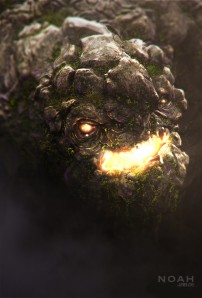
People mean! ME SMASH.
Now, I really like the idea of including the Watchers in this story, as there is vague talk in Genesis about fallen angels and mysterious creatures called the Nephilim, who have been speculated to be fallen angel/human hybrids (more on the Nephilim can be found here). However, I just can’t get behind the rock monster thing. They’re very well done in terms of special effects, but I personally found them silly looking and difficult to take seriously.
Madeleine L’Engle, one of my favorite writers, also did a retelling of Noah’s Ark in her book titled ‘Many Waters.’ She also included fallen angels; the Nephilim. They appear human-like, except they are freakishly tall, have wings, and can turn into animals.
The reason I bring this up is because I wish Aronofsky had done something like this instead of the Mineral Monsters. In L’Engle’s story, the Nephilim are evil (hence them being “fallen” angels). Oh, and they are SUPER creepy. Physically attractive and dripping with charm, many of them have managed to acquire human wives. They were so much more emotionally jarring than the Watchers were, and for me, if given a choice between ’emotionally jarring’ and ‘good for cool action scenes,’ I will pick the former much of the time.
Anyways, one of the Pebble People decides Noah ain’t such a bad guy, so the Watchers reluctantly let them go about their business. When they finally arrive at the mountain, Noah and his oldest son Shem (who looks to be about ten years old), leave the rest of the family behind and hike the last leg of the trip to Methuselah’s cave alone.
Upon meeting Shem for the first time, Methuselah asks him what his favorite thing in all the world is. Shem replies: “Berries.”
Dream big, Shem.
Methuselah then tells Shem that if he ever finds any berries, please bring him some. Remember this guys, because it’s going to become an important subplot when it grows up.
Methuselah doesn’t prove to be very helpful in elucidating Noah’s dream, so Noah wonders aloud what was the point of him coming at all, and silently the whole audience is asking themselves the same question. Then Methuselah’s like “But wait…there’s more!” and tells Noah that he slipped him some LSD or Rohypnal or something in his tea. Noah passes out and has another awesomely creepy dream about the flood, but this time, he sees the ark too.
Because if God wants to tell you something important, He has to wait for an old man to give you a roofie first.
Lesson: let old men give you roofies.
Methuselah also gives Noah a seed passed down from the Garden of Eden. When Noah plants it, a stream bubbles up and a forest shoots instantly from the ground. The Watchers, who were watching (get it?), are now finally convinced that Neo is the One. I mean, Noah.
Did I really just spend time making this?
Blah blah, eight years later, construction on the ark is almost complete, blah blah, the Watchers are their friends now, blah blah. Animals start showing up, the Black Hats have fewer resources and are starving, and Ham is sulking because he doesn’t have a girlfriend. Because this is an 80’s teen sitcom now.
Seriously, though. Ham’s got some legitimate concerns. For starters, everyone is going to be dead soon. No girlfriend now, no girlfriend EVER. Good ol’ Dad realizes this, and sneaks into the Black Hats’ settlement to find two girls for Ham and Japheth to assure the continuation of the human race. Shem doesn’t need a ladyfriend, because he’s got Ila. Even if he did need a ladyfriend, he probably wouldn’t need Dad’s help getting one.
While Noah is there, he sees a whole bunch of disturbing stuff. Some guy drags off a couple of girls to sell them (either into slavery, prostitution, or for use as much-needed meat–yeah, gross), and I’m thinking “Woo, Super Noah! Go save those girls and bring them back to the ark with you,” but no, instead he gets all existential and angsty and goes back to the ark empty-handed. Uh, Super Noah?
When Noah gets back, he tells his wife Naameh that they are no different from the sinners the Creator wants to destroy and that they shouldn’t be trying to repopulate the Earth; they should just save the animals, and then allow themselves to die out. Naameh thinks Noah’s off his rocker, so she goes to visit Methuselah in his cave and asks for his help.
Ham is mega-huffy that his Dad didn’t bring him home a girlfriend, so he runs off into the woods. Ila, who’s just had a little spat with Shem because she’s upset that she can’t provide children for him, runs after Ham.
While looking for him, she happens upon Methuselah, who is rooting around for, you guessed it, berries. Awww, my little subplot’s all grown up.
Methuselah beckons to Ila, who’s really weirded out by him at first, but then he heals her womb with his magical powers that he apparently has, so she gets really excited and starts to run back to the ark. On the way she bumps into Shem, and, because she is now terribly fertile, she throws herself at him and starts ripping his clothes off. Because this is the best time to fool around. Right now.
I was not a fan of this particular plot development at all. First of all, we have no idea who Shem and Ila are as a couple, so we have no reason to care whether they reconcile or not. I mean, I get that the whole point of this is the continuation of humans, or whatever, but come on. How are we supposed to care whether there are more humans or not if we don’t even care about the few humans we’ve already got?
Who the heck is Shem, anyway? He’s hardly ever in the story. He’s just kind of…there. Sometimes, he stands next to things. Oh, and his hair wafts around in the breeze a lot. Ila had a little more to do and a lot more screen time, but I still didn’t come out of the theater feeling like I had any idea who she was as a person.
I would have preferred Shem finding Ila first, making up with her, and THEN Methuselah could come along and sprinkle her with his magic pixie dust. That would have given us at least some idea of what their relationship is like and why we should be interested in it. You know, by NOT removing obstacles from their path with convenient plot manipulations.
Anyway, while all this is happening, Ham is wandering around the Black Hats’ settlement looking desperate. He falls into a ditch full of dead people and meets a grimy female who appears to be either very traumatized, or very insane. Probably both.
Ham’s really nice to her, so she agrees to go back to the ark with him. However, it starts to rain, and the Black Hats start to freak out because Noah was right all along and now they’re all toast. So, they all run off to try to get on the ark right as Ham and his new ladyfriend are starting to head back themselves.
Shem and Ila finally get back to the ark and Noah’s like “Where’s Ham?” and they look at each other guiltily because OMG, they totally forgot about Ham because they were too busy getting it on in the woods.
Ham and Potential Girlfriend (whose name I can’t remember because she wasn’t that important to anyone but Mr. Wildly Desperate) are trying to outrun the Black Hats, but then Potential Girlfriend gets her leg caught in a trap. Ham tries to help her, but he can’t get her out, and the Black Hat stampede is closing in rapidly behind them.
Suddenly, out of a nearby phone booth, Super Noah appears! Assessing the situation, Super Noah drags Ham away from Potential Girlfriend and leaves her to be trampled to death by hordes of Black Hats.
Naturally, Ham is displeased by this turn of events. “She was innocent!” he cries, his eyes filling with tears. Yes, because she was a creepy girl you met on a pile of dead bodies and knew for five minutes. Of course she was innocent.
But alas, Ham’s cries fall on deaf ears, because Noah is still having some kind of existential crisis and thinks that his whole family should die along with everyone else. And he’s upset that nobody seems to understand his point of view. Poor Noah.
The only story-line I really care about in this movie is whether or not Methuselah is ever going to find a berry. Poor me.
Then, we get the whole reason the Watchers were even in this movie at all: a Really Big Action Scene. Noah and his family all get on the ark, and the Rubble Riffraff position themselves around it and start tossing Black Hats around like parade candy.
Little did everyone know, most of the Black Hats who were storming the ark were actually Shem fangirls.
Tubal-Cain, the Main Bad Guy, manages to make it around one of the Watchers and sneak onto the ark. Because otherwise, who would cause conflict and pose a threat to our plucky heroes and heroines? What would the climax of our film be? We must stick to the basic formula and keep the Main Bad Guy alive until the very end!
Methuselah, in the meantime, is still out in the woods looking for his berry. Yup. Suddenly, a giant wave comes crashing through the forest towards him. Right at the same moment, Methuselah finally finds his berry. HALLELUJAH NOW HE CAN DIE
Wait…what?
Methuselah meets the massive wall of water coming right at his face with arms outstretched, like he wants to give his own death a big hug or something. Because he’s really old, guys. It’s his time.
The only real problem I have with this is that no one else in Noah’s family seems to be the least bit concerned about their dear old Granddad. All it would take is one stinking line of dialogue, i.e. “where’s Methuselah,” to assure us that no, these people are not soulless and heartless, and they do care what happens to their immediate family.
Anyway, back at the ark the Cobblestone-Patch Kids have begun sacrificing themselves. Their rocky exterior is pried off by Black Hats (or by themselves) and their pretty, glowing innards shoot straight up to heaven, exploding as they go. Hooray! They’ve been redeemed!
The flood happens. Everyone dies. And then, we come to the only part of the film that I had an emotional reaction to. We see people clinging to a rock jutting out of the swirling water, then, we cut back to Noah inside the ark, where we can still hear those same people screaming. His family begs to be allowed to let some of them in; they have room. But Noah refuses.
Gathering his family around, Noah tells them the story of Creation and the Fall. He then tells them that they will all die out eventually and that Japheth will be the last man alive. He apologizes to Ham about his Almost Girlfriend, and Ham responds by pointedly leaving the room, because he is 400% DONE, guys.
So Ham leaves, and discovers a broken-legged Tubal-Cain stowed away somewhere on the ark. For some reason, he doesn’t tell anyone about this. Okay, Ham. I was with you until now. Would you kindly explain yourself? No? Okay.
Ila wakes up one day with morning sickness, and Naameh tells her that she’s probably preggers. The rain suddenly stops, which they take to be a sign that the Creator has smiled upon the child, but Noah gets really mad because this has messed up his whole plan, and tells Ila angrily that if this unfortunate kid is a girl, he’ll kill it.
I’m sorry, but is Noah prone to psychological breakdowns? Don’t get me wrong, I actually really like this little crisis he’s having right now. It’s totally plausible that a deeply spiritual guy is going to have a lot of inner turmoil about wiping out humanity only to repopulate it with more people who might still turn out the same way. But now he’s gonna kill a kid? Where did that come from?
I don’t sympathize with Noah at all. I don’t see the natural progression of his descent into madness. One minute, he’s a normal guy, the next minute he’s upset, and then the next minute he’s insane and homicidal. I don’t get it. I mean, I get him saying he’ll kill the kid in a moment of frustration and weakness, but after this scene, we skip over the entire nine months of Ila’s pregnancy, and Noah’s still plotting murder.
So, it is now the aforementioned nine months later, and Ham is apparently in cahoots with Tubal-Cain, who is manipulating him to kill his own father using Noah’s plan to kill Ila’s baby as a primary motive. Ham appears to be just going along with it. And again, I don’t get it.
I get that he’s mad at his dad, for a number of totally justified reasons. And I get that Tubal-Cain is manipulating him. But I wish we could have at least seen a glimmer of how this evil guy is somehow managing to coerce Ham into murder. Since we skipped over that part, the whole thing just doesn’t feel natural.
Maybe if Aronofsky had cut out some of that stuff at the beginning of the movie where Noah’s kids are all wandering around being played by child actors, we would have had time for more important stuff later. Like this.
Shem and Ila have made a raft with which to escape before the baby is born, but Noah gets a torch, burns it, and then stares at them intensely.
Suddenly, Ila goes into labor. Naameh ushers her away to have the baby in privacy, and Ham materializes to tell Noah that he has to come quickly because the animals are tearing each other apart.
Noah goes down into the bowels of the ark with Ham, where Tubal-Cain is waiting for him. He jumps on Noah, and the two of them duke it out. Ham stands aside, torn between the two of them.
While this is all going down, Ila has given birth to twin girls. Shem freaks and runs off to find Noah to keep him away from the babies. He comes in on Noah and Tubal-Cain mid-fight and tries to get involved, but Tubal-Cain bats him aside like a pesky horse-fly and shouts that Noah is his to kill.
Tubal-Cain finally gets Noah pinned down, and, raising a knife over his head, gets ready to kill him. But then, Ham suddenly decides to come to his senses and stabs Tubal-Cain from behind. Tubal-Cain gives Ham the snake-skin, says “Now you’re a man,” and then topples over and dies.
Noah runs to the upper level of the ark and bursts into the delivery room, ready to murder some babies.
Heeeeeeeere’s Noah!
But all Noah finds in the delivery room is Naameh, alone. She lies and tells him the baby is a boy, but Ila’s absence from the room tells Noah otherwise. Naameh weakly grabs at him, trying ineffectually to stop him, but Noah rushes away and climbs the ladder leading to the top of the ark.
Come on, Naameh. I understand that you’re a woman and consequently have no upper body strength, but that was just lame. I could have done better than that, and the only exercise I get is typing and walking back and forth between my bed and the refrigerator.
Noah finds Ila standing on top of the ark, holding her twin sacks of potatoes–I mean, girls–in her arms. Noah comes at them with a knife, but Ila cries and asks him to let her quiet them so they can die peacefully. Noah stands back, and Ila sings her daughters a song that Noah used to sing to her when she was a little girl. Hey, I see what you’re doing there, Ila!
The babies stop crying, and Noah approaches with the knife. Okay, Ila. Your lullaby idea was great, but clearly, it failed to tap into Noah’s humanity. What’s your big plan now?
Apparently, Ila’s new plan is to cry and say “Do it quickly!” Do it quickly? That’s it? You’re not going do anything else? Your big plan is…to stand there? Also, where is everyone? Tubal-Cain didn’t hit Shem that hard. Are we supposed to believe he’s still knocked out? Is Ham just sitting down there, obsessing over his own angst? And how long does it take Naameh to climb a ladder, anyway? Is it those weak, feminine arms that are holding her back?
Oh wait, here’s Naameh, at last. And…she’s standing there. Okay, Naameh. Be useless. That’s fine.
But luckily, at the last minute, Noah can’t bring himself to kill the sacks of potatoes–I mean, the CGI babies they borrowed from ‘Breaking Dawn.’ He instead kisses their heads as a dove flies overhead with a sprig of greenery in its mouth.
The water is drying up, and the family finds a place to land. Noah separates himself from everyone else and goes to live alone in a beach cave. Like great-grandfather, like great-grandson, I guess. He feels really guilty about everything that happened, so he gets super drunk and hangs around naked. (Which actually does happen in the Bible, by the way, just not under these particular circumstances.)
Ham gives his dad back the snake-skin, and then I guess because he’s still mad at him or something, he packs his things, says goodbye to everyone, and leaves.
Shortly after this, Noah has a (fully clothed) heart to heart with Ila, and she asks him why he spared her daughters. He tells her that when he looked at them, he felt nothing but love, but he’s also still upset because he feels like he failed the Creator. Ila tells him that he didn’t fail, rather, his mercy was proof of humanity’s capacity for good.
Noah comes home to his wife, and they kiss and make up. Later, they all gather together and Noah performs the ritual of blessing his new granddaughters with the snake-skin. A rainbow appears in the sky and everyone is happy(ish).
So, that was ‘Noah.’
Again, it’s got some good stuff going for it. Really interesting theological background, great acting and special effects, and a few really evocative moments. But there was so much that just didn’t work for me. Not to say that I wouldn’t recommend it–I would. It’s definitely worth seeing.
But this review is so late most of you have probably already seen it anyway.
Even if you hadn’t, I just kinda gave away everything that happens. Sorry bout it.
